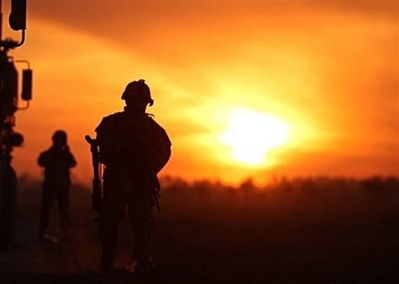The Pentagon's top military officer said Wednesday that he is likely to recommend further troop reductions in Iraq this fall. Adm. Mike Mullen, chairman of the Joint Chiefs of Staff, said that on his recent trip to Iraq, he found conditions had improved more than he expected.

US soldiers patrol the outskirts of the town of Baquba, 20 kms northeast of Baghdad, in February 2008. Admiral Michael Mullen, the chairman of the US Joint Chiefs, said Wednesday he would likely recommend "further troop reductions" in coming months if security continues to improve in Iraq. [Agencies]
"I won't go so far as to say that progress in Iraq from a military perspective has reached a tipping point or is irreversible -- it has not, and it is not," Mullen told a Pentagon press conference.
"But security is unquestionably and remarkably better. Indeed, if these trends continue I expect to be able early this fall to recommend to the secretary and the president further troop reductions," he said.
His remarks came in the midst of an election year in which Sens. John McCain and Barack Obama, the Republican and Democratic presidential nominees-in-waiting, have disagreed over US strategy in Iraq with the war now in its fifth year.
The issue of troop levels in Iraq also has been weighing heavily on plans for boosting troop levels in Afghanistan, where violence is on the rise.
The military buildup in Iraq that began more than 18 months ago has ended. In recent days, the 3rd Infantry Division's 2nd Brigade, the last of the five additional combat brigades sent in by President Bush last year, left the country.
Its departure marks the end of what the Pentagon calls the "surge." And it starts the 45-day evaluation period that Gen. David Petraeus, the top US commander in Iraq, told Congress he would need to assess the security situation and determine how many more troops he could send home. Commanders have talked carefully, but somewhat optimistically, about the prospects for cutting troop levels more later this fall.